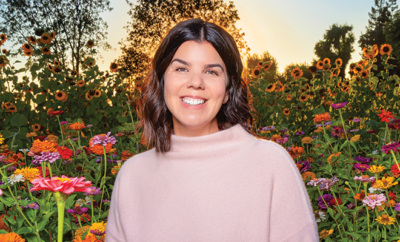 Conrad Borba
Conrad Borba
Loukoumades, Dolmades, Baklava, Oh My!
Everyone loves a great festival, and St. Basil’s annual Greek Food Festival is truly one of the greatest. This family-friendly event has drawn crowds for 65 years and will take place again September 5 through 7, 2025, on the St. Basil’s church grounds at 920 W. March Lane in Stockton.
In keeping with tradition, numerous food stations will sell authentic Greek main dishes and desserts, all homemade from original recipes. The festival is enjoyable for all ages and provides plenty of seating, indoors and out, to gather with friends and take it all in, from people-watching to Greek dancing. A variety of shopping booths, entertainment and live music will round out the event as well as church tours for anyone who wishes to see the beautiful facility and learn about Greek Orthodox Christianity.
The Beginning
Long ago, in 1961, much of March Lane was still empty and undeveloped. That year, Saint Basil Orthodox Church purchased its current lot with plans to build a small hall and kitchen before relocating from their Stanislaus Street location in downtown Stockton. In its early years, the Greek food festival took place in several other locations, including the Civic Auditorium, Delta Community College and the Scottish Rite Temple. In 1986, the church was finally able to hold the festival on its own grounds. To this day many people come back year after year, even some who now live out of state, to help with this special event.
Generations of attendees and volunteers have fond memories of participating in the festival for decades, some all their lives. Gayle Maduros is one of those people, having overseen the festival’s pastry production for close to 25 years. Fifty-five years ago, when she and her husband, Bill, moved from Chicago to California, they didn’t know anyone locally. “The church became our family,” she explained.
“In the early days, ladies of the church from Stockton, Lodi, Manteca and Tracy had been making the pastries at home and bringing them to the festival,” Gayle recalled. “They gave me their authentic Greek recipes on scraps of paper and I put them into a binder. Then, using those recipes, we began gathering in the church kitchen to make the foods on site. The preparations took two to three weeks and were really something of a social event,” she laughed. “They even put a TV in the room where we worked so that the older ladies could keep up with their soap operas.”
Transitions
The cooking was steeped in tradition, and change was difficult for some. When Gayle wanted to start using a machine to speed up the production of loukoumades, the small spheres of fried donut batter served in honey syrup, some of the older members became grim-faced and insisted the popular treats would never be the same. Luckily, Gayle’s instincts were spot-on and the tiny, machine-cut treats were indeed the same as those painstakingly made by hand. “Exactly the same,” Gayle said, laughing as she reminisced about their suspicions.
As luck would have it, the old-school skeptics were ultimately won over by Gayle’s mother-in-law, Alexandra Maduros. Alexandra had owned a Greek restaurant in Manhattan, Kansas, and was an outstanding cook. She fit right in and quickly earned their trust. Of Norwegian and Swedish descent, Gayle distinctly lacked a Greek pedigree but was accepted as something of an honorary Greek by virtue of having married into a Greek family and her ongoing involvement with the Orthodox Church.
Not only are all the festival foods homemade to this day, Gayle said “very few” frozen ingredients are used in the process. The one exception is a special filo dough that they order from New Jersey by the case. “We found that this filo is of the highest quality and has the best taste. It’s an important ingredient when you consider all the foods filo is used for, the sweet baklava desserts and the savory spanakopita, to name just two of the most popular dishes,” she explained.
Oh, The Food!
According to Gayle, no food on the festival menu requires more advanced planning than the dolmades, all 5,000 of them. Classic dolmades are grape leaves stuffed with a seasoned blend of rice and meat and topped with avgolemono, a creamy lemon sauce. There are no canned or preserved grape leaves to be found here, Gayle assured. The dolmades-making work party at church is a finely tuned assembly line producing the savory specialty, each containing tender perfection in every bite.
“Now even our priests join us to make the foods,” Gayle said. “Father Gabriel Cupsa and Father Pete Sotiras join us for lunch and it’s a nice social time with everyone sitting at long tables, working together.” Deeply fond of the parish, its Greek Food Festival and all who work so hard to produce it, Gayle affirmed, “It’s a tradition we hope to always carry on.”
There are special teams in charge of cooking the many foods including roast chicken, calamari, hummus, meatballs, gyros and spanakopita. Over the years, they have refined which recipes work best for every dish. Gayle set her personal record for production the year she made twenty-two casseroles of galacktoboureko, a traditional Greek custard stirred slowly and patiently over low heat on the stove. “It requires gallons and gallons of milk and dozens of eggs,” she mused. It’s hard work, but Gayle and all the festival cooks are proud that every item is still made from authentic old recipes, by hand, using the freshest and best ingredients.
The Impact
The money generated by the yearly festival goes to support a variety of community programs, both local and afar, via the Ministries Charities of the Greek Orthodox Church. Funds are donated to Hospice of San Joaquin, Stockton Women’s Center, St. Mary’s Dining Hall and the Food Bank. Donations are also made to The Metropolis in San Francisco for education, seminars and other worthwhile endeavors approved by the Greek Orthodox Church.
Peter Koulouris, past president of St. Basil Parish and director of the Greek Food Festival, shared, “Our family roots go way back. In 1900, my paternal grandfather’s family was the very first Greek family to settle in Stockton.” Peter’s lifelong love of the festival began when he was just seven years old. “One of my favorite childhood memories is of enjoying the koulourakia, the traditional butter cookies known for their distinctive twisted shape. “My mother, Mary Koulouris, was in charge of the loukoumades booth. Hers were the best around, and she was very happy when the loukoumades machine was donated. It makes me smile to remember it,” he reminisced warmly.
“‘Bigger, Better, Greeker!’ That’s our festival motto,” Peter said with infectious enthusiasm. While it’s hard to imagine the Greek Food Festival getting any bigger, better or more Greek than it already is, Peter is achieving exactly that. As the festival director, he is deeply committed to upholding the traditions, especially ensuring food quality, while always implementing new ways to improve the festival experience.
The Environment
This year Peter will ensure visitors stay cool and comfortable via overhead shade cloth and an outdoor misting system identical to those used at the Acropolis in Greece. New foods will be featured, and he has booked a Bay Area group, KYMATA, to perform live music. He predicts that the new taverna area with even more seating will be the most popular spot on the grounds. The taverna will serve imported Greek beer, IPAs, beers on tap, select wines from local vintners and a variety of refreshing nonalcoholic beverages. A snow cone booth and carnival area for kids are sure to be just as well received.
Asked about his own must-have favorite foods, Peter replied instantly, “Lamb chops. The lamb chops are phenomenal! And the calamari is just outstanding. The gyros, pastries and the baklava, definitely.” He is just as enthused about this year’s new souvlaki and said, “They are truly authentic, just like the ones served in the villages of Greece.”
In regard to the process of putting on such a big event, Peter elaborated, “One thing that might surprise people is the amount of work involved to put on a three-day event of this caliber, and how massive the event is. It’s a heck of an operation. But our team leaders are awesome,” he emphasized. “After all these years the institutional knowledge held by this group of experienced people who put on this event and then hand that knowledge down—it’s just a force of its own at this point. It’s a wonderful phenomenon at the parishioner level that allows this to continue.”
Like Gayle, Peter enjoys a strong connection and sense of family within their parish. “I love the festival,” he said. “I’ve loved it my entire life, and I’m always looking for ways to make the experience even better for those who attend. In fact, the community itself, by attending, is every bit as important as all the volunteers who make the festival happen and I am so grateful because we love the church, we love our parish, and we love being able to benefit so many people.”
Tickets are $5 at the door and children 11 and under are admitted free with an adult. For tickets and more information, please visit stocktongreekfoodfest.com or call 209-478-7564.










